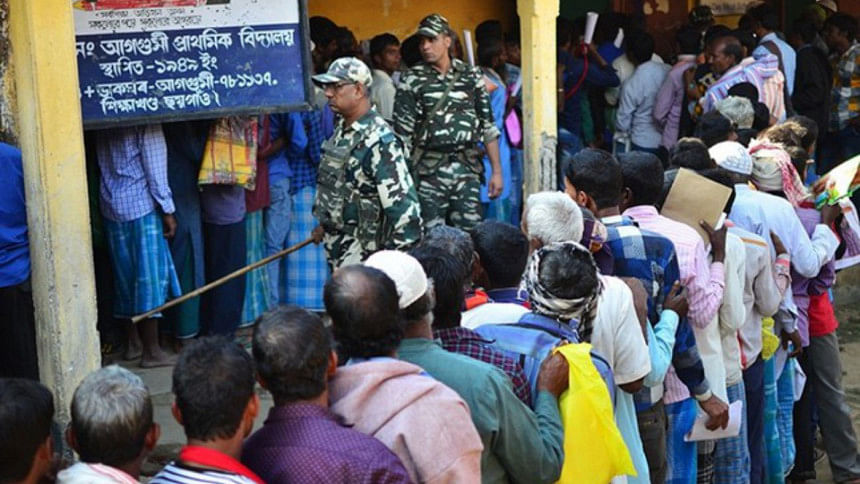Mass disenfranchisement as grand strategy?

On July 30, in a massive official drive in the north-eastern Indian state of Assam to segregate "the illegal infiltrators" from legal citizens, a list depriving over four million people of the right to live in the country was made public. According to the National Register of Citizens (NRC) list facilitated by the registrar general of India, only those individuals who can prove they lived in Assam before March 24, 1971—in line with the 1985 Assam Accord—will henceforth have a lawful claim to Indian citizenship.
In 1971, amid the chaotic circumstances surrounding Bangladesh's secession from Pakistan, hundreds of thousands fled to India in fear of their lives, crossing the border at their own peril. This sparked off a tug of war between the refugees and the host communities, which was purportedly to be resolved with the eventual conclusion of the Assam Accord by Rajiv Gandhi's Congress government then in power. In the current vitriolic environment, rooted in the ruling Bharatiya Janata Party's nationalist agenda and anti-Muslim attitudes, there has been a renewed focus on implementing the accord, which envisaged deporting the post-1971 incomers, though the numbers potentially affected would render this one of the world's largest efforts at disenfranchisement.
What can go wrong?
On a closer look, the foreseeable repercussions of this move emerge. First, it contains premonitions of a humanitarian crisis which could engulf the entire subcontinent, comparable to that associated with the Rohingya influx into Bangladesh.
Secondly, tensions between India and Bangladesh will only rise—contrary to what the current situation demands—as the refugees are driven back to that country. In his last bilateral engagement with the Bangladeshi Prime Minister, Sheikh Hasina, during her visit to Shantiniketan, the Indian premier, Narendra Modi, talked about taking their partnership to a new height. Yet with this spurning of the Bangladeshi refugees, the bilateral ties are likely to spiral downwards, which can have concomitant impacts on multilateral relations. As India strives to balance out the Chinese presence in the sub-continent, the slightest tremors in Indo-Bangladeshi relations would give China the opportunity to accentuate further its strategic presence in Bangladesh.
Thirdly and most widely, this episode could precipitate a status crisis for India as a nation-state commanding an extraordinary claim to exceptionalism, banking on its humanitarian engagements on foreign soil, especially in the subcontinent. For instance, India has been a prominent development partner to Afghanistan's state-building exercise, providing, in the last year alone, aid of more than USD 2 billion, having engaged for years in strengthening the capacity of government mechanisms, while deferring from setting a military foot on the ground. Yet, while the BJP government has etched as its prime foreign-policy goal the establishment of India as a global power, the Assam demarche threatens to taint India's status at the international level.
Status, in international relations, is inter-subjective and value based: it is contingent on mutual perceptions between states, not just the self-perception consolidated with legitimate recognition in the global domain. In this context, India has a strong voice as a country with an exceptional record in resolving humanitarian crises, inspired by its endorsement of strategic autonomy in foreign-policy deliberations. It turns out, however, that the exceptionalism which seems to have allowed India to stand out has been mere rhetoric confined to empty promises.
The strategy of disenfranchising a certain section of the population, who supposedly do not deserve the armour of citizenship to protect their right to live, tears at the moral fabric of India, where the values of democracy and free speech have been elevated to high esteem.
What can be done?
It is imperative that the government in New Delhi reflect much more seriously on the consequences of the unfolding scenario in Assam, the ramifications of which could put in question the status of India in the global arena. In the recent past, when talk of humanitarian intervention by India in the Maldives crisis was high, the citizenship bill was seen as setting a bad example, suggesting other nation-states shouldn't buy India's claim to the status of a humanitarian leader.
Moreover, India and Bangladesh should cease treating this as an opportunity to enter new caveats in their bilateral strategy but rather see eye to eye on the challenges with which both countries continue to grapple—bearing in mind that India also wants to ward off China's efforts to enhance its influence over Bangladesh. In the last few months, there has been a concern over the Rohingyas in India, towards which the Supreme Court was nudged by the central government, dabbling in the case for deportation of those refugees. As a country amenable to immigrants and officially giving high regard to peaceful settlement of conflict, India should be proactive in engaging with multilateral partners to resolve situations that call for collective action, rather than pursuing a right-wing inspired, unilateral approach which puts millions of people at risk. As the Modi government faces its ultimate test—the general election in 2019—its domestic and foreign-policy strategies ought instead to reflect the diversity with which India has credited itself for decades, alongside commitment to peacebuilding and humanitarian support in crisis situations.
Baisali Mohanty is a foreign policy analyst who writes on security and conflict issues focusing on Asia Pacific. She is a Senior Analyst with the Global Risk Insights and was previously associated with the Asia Council, Tokyo.





Comments